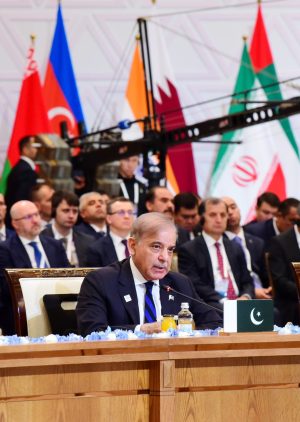Pakistan’s Prime Minister Shehbaz Sharif during his recent participation at the Shanghai Cooperation Organization (SCO) summit in Astana described the issue of terrorism as a major concern for member states and called for collective efforts to counter the challenges posed by militancy.
Sharif’s speech at the SCO summit reflected the urgency with which Pakistan views the threat of terrorism and its desire to see regional countries take a more proactive role in addressing this issue. Pakistan has long been grappling with the problem of terrorism, with militant groups like the Tehreek-e-Taliban Pakistan (TTP) carrying out attacks against the country’s security forces.
The premier’s focus on terrorism as a regional problem was motivated by three key factors.
Firstly, the SCO summit provides Pakistan with an opportunity to bring its concerns to a forum that includes its neighbors, key allies, and adversaries, such as China, Russia, and India. Sharif used this platform to build a case for Pakistan being under the threat of “state-sponsored terrorism,” indirectly accusing India of supporting and carrying out assassination campaigns in the country.
Secondly, Sharif’s emphasis on the terrorism issue was also driven by Pakistan’s bilateral challenges with the Taliban regime in Afghanistan. Islamabad has been struggling to convince the Afghan Taliban to disallow militant groups like the TTP from operating against Pakistan. However, its efforts have been largely unsuccessful, with the two countries’ ties suffering as a result. The Afghan Taliban have traditionally refused to discuss terrorism with Pakistan at international forums, calling on Islamabad to resolve its issues with the TTP bilaterally. This has frustrated Pakistan as the country has not been able to build regional pressure on the Afghan Taliban to contain TTP.
During the SCO summit, the Pakistani premier urged the interim Afghan government to “take concrete and effective measures to prevent the use of Afghan soil for terrorist attacks against other states” in an effort to put pressure on Kabul from a regional perspective and highlight the threat emanating from Afghanistan. Moreover, other leaders who spoke at the SCO forum emphasized the importance of a peaceful Afghanistan for regional stability. A former observer state, Afghanistan, did not attend the meeting.
Thirdly, the timing of the SCO summit was important for Pakistan as it has announced a new counterterrorism campaign, “Zarb-e-Istehkam,” to defeat the rising threat of militancy by enlisting support from regional countries. SCO was the first major gathering of regional powers where Pakistan could make a case for its counterterror campaign and rally support for its upcoming measures to fight militancy domestically.
Pakistan desperately needs regional support to resolve its problems with terrorism and militancy, some of which stem from Afghanistan, while others originate from across the border with Iran and elsewhere. Taking part in the forum allowed the country to express its frustration as it struggles to convince regional countries to pay attention to its militancy concerns.
However, it remains to be seen whether Pakistan was able to make tangible progress in convincing countries like China, Iran, Russia, and others to back its counterterror initiatives at the regional level and compel India as well as the Afghan Taliban to refrain from undermining its security interests.
It is pertinent to note that Pakistan’s closest regional ally, China, has urged the country to swiftly root out militancy, a factor that has undermined bilateral cooperation. At the same time, Beijing has not actively helped Pakistan address its militancy concerns vis-à-vis Afghanistan by pushing Kabul to address Pakistan’s concerns.
By raising the issue at the SCO summit, Prime Minister Sharif attempted to rally regional support and cooperation in countering the challenges from militancy. However, the big question is whether these calls will translate into practical support from regional allies and countries.
It seems unlikely that Pakistan will receive the support it is looking for.
One reason is that previously, regional states had similar complaints with Pakistan and found it frustrating to convince the country to address their concerns.
Moreover, Pakistan’s security policy has frustrated many in the region, with some of its allies convinced that Pakistan lacks the will to fight militancy and extremism at home, which they believe is the root cause of much of its extremism-related problems that at times spill over its borders.
Overall, Sharif’s speech at the SCO summit reflected Pakistan’s continued struggle with the problem of terrorism and its desire to see regional countries take a more proactive role in addressing this critical issue.
To convince forums such as the SCO to take Pakistan seriously on its terror concerns, Pakistan must demonstrate its resolve at home by building consensus and avoid giving the impression to regional powers that the country is incapable of forging a united anti-terrorism plan because of political infighting. The failure to demonstrate resolve and a united front will only result in Pakistan’s calls for cooperation going unanswered by the regional community.

































